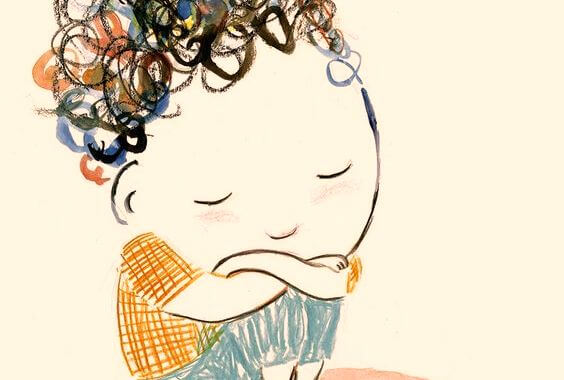Brilliant Parents Are Those Who Excite Their Children

There are good parents, and then there are brilliant parents. There are many different ways to raise children, and they’re as varied and multicolored as the parents that exist. Most parents want the best for their children, love them, and want them to be happy. That’s why they establish rules and limits that create a unique system for their own home. The dynamic is different for every family and can be modified and revised as the adults see necessary.
The rules and limits established by parents have to be clear, direct, and firm. In addition, they have to be revised and rewritten as often as necessary. That sets the foundation for the dynamic of each family, which varies and fluctuates according to the stage the family is in. These situations, which are seasoned with emotions and peppered with unforeseen events, will make up the broth of the psychoemotional development of each family member.
Good parents and brilliant parents
Augusto Cury, physician, psychiatrist, therapist, and writer, wrote a book called Brilliant Parents, Fascinating Teachers, which provides tips for how to raise happy, proactive, secure, and intelligent children. In addition, he analyzes the habits of good parents and those of brilliant parents.
Children need parents who can speak their language and penetrate their hearts.

1. Good parents give gifts, while brilliant parents give their entire selves
Good parents satisfy their children’s desires to the extent that resources allow. They buy them clothing and toys, throw them birthday parties, take them on trips, etc. Brilliant parents give them something more valuable, something that can’t be bought with money. They give them all of themselves, their story, their experiences. They share their emotions and their time. This habit of brilliant parents contributes to the development of their children’s self-esteem, emotional intelligence, ability to handle loss and frustration, and ability to speak and listen.
2. Good parents feed their children’s bodies, while brilliant parents feed their personalities
Good parents feed their children so that they’re healthy, while brilliant parents also concern themselves with nurturing their intelligence and their emotions. Being educated, being in good economic standing, having an excellent marriage, and sending them to good schools isn’t enough for their psychoemotional health. It’s important to prepare children to be, not just to have. This habit of brilliant parents contributes to the development of their children’s sense of security and their abilities for leadership, reflection, courage, optimism, fear management, and conflict prevention.
3. Good parents correct their children’s mistakes, while great parents teach them to think
When parents correct their children’s mistakes and tell them the same things over and over again, they’re just repeating words and complaints, which has no effect on the children. It only leads to aggression, frustration, and distance. We have to surprise our children. Excite them. Make them reflect. This habit of brilliant parents contributes to the development of their children’s critical awareness, ability to think before they react, fidelity, honesty, ability to question, and social responsibility.
“Emotional intelligence begins to develop in the earliest years. All the small exchanges children have with their parents, teachers, and with each other carry emotional messages.”
-Daniel Goleman-

4. Good parents prepare their children for praise, while brilliant parents prepare them for failure
Good parents prepare their children for triumph, good grades, and success in school, work, and social relationships. Brilliant parents are aware that it’s more difficult to face failure, so they help them to be unafraid of failure. This habit of brilliant parents contributes to the development of their children’s motivation, boldness, patience, determination, ability to pull themselves together, creativity, and ability to take advantage of their opportunities.
5. Good parents talk to their children, while brilliant parents have a dialogue with them
Many parent’s aren’t capable of having a dialogue with their children about their fears, losses, and frustrations. Having a dialogue involves expressing oneself, talking about experiences, sharing one’s secrets from the heart, and going deeper than behavior. By having a dialogue with their children, brilliant parents help them develop solidarity, camaraderie, zest for life, optimism, and interpersonal intelligence.
6. Good parents give their children information, while brilliant parents tell them stories
Good parents inform their children, but they don’t tell them stories or have a dialogue with them. Children don’t need authority, money, or power as much as they need to spend time with their parents and listen to stories full of emotions and experiences. They need brilliant parents who help them develop creativity, resourcefulness, cleverness, schematic reasoning, and the ability to find solutions.

7. Good parents give their children opportunities, while brilliant parents never give up
Good parents overlook their children’s mistakes. Brilliant parents never give up, even if their children disappoint them, make mistakes, and suffer emotional disorders. Brilliant parents believe in their children, try to see what nobody else sees in them, help them cultivate ideas, and aren’t dominating towards them. They help their children develop respect for life, hope, motivation, determination, and the ability to question themselves and overcome obstacles and failures.
Sometimes parents lose confidence. They feel like failures as parents. But it’s important to remember that, sure, being a parent involves a great responsibility, but always coming from a place of affection and simplicity. We can learn child-raising strategies, we can read the theories of Piaget and Vigotsky, the psychoanalysis of Freud, Gardner’s multiple intelligence theory, and the philosophy of Plato for decades, but if we don’t love our children, get them excited, teach them to think, or ingrain things into their memory, no study or theory will be valid or applicable.
It’s about making an impact in the emotional and rational universe of your children and being creative and sincere. It’s about making them excited.
There are good parents, and then there are brilliant parents. There are many different ways to raise children, and they’re as varied and multicolored as the parents that exist. Most parents want the best for their children, love them, and want them to be happy. That’s why they establish rules and limits that create a unique system for their own home. The dynamic is different for every family and can be modified and revised as the adults see necessary.
The rules and limits established by parents have to be clear, direct, and firm. In addition, they have to be revised and rewritten as often as necessary. That sets the foundation for the dynamic of each family, which varies and fluctuates according to the stage the family is in. These situations, which are seasoned with emotions and peppered with unforeseen events, will make up the broth of the psychoemotional development of each family member.
Good parents and brilliant parents
Augusto Cury, physician, psychiatrist, therapist, and writer, wrote a book called Brilliant Parents, Fascinating Teachers, which provides tips for how to raise happy, proactive, secure, and intelligent children. In addition, he analyzes the habits of good parents and those of brilliant parents.
Children need parents who can speak their language and penetrate their hearts.

1. Good parents give gifts, while brilliant parents give their entire selves
Good parents satisfy their children’s desires to the extent that resources allow. They buy them clothing and toys, throw them birthday parties, take them on trips, etc. Brilliant parents give them something more valuable, something that can’t be bought with money. They give them all of themselves, their story, their experiences. They share their emotions and their time. This habit of brilliant parents contributes to the development of their children’s self-esteem, emotional intelligence, ability to handle loss and frustration, and ability to speak and listen.
2. Good parents feed their children’s bodies, while brilliant parents feed their personalities
Good parents feed their children so that they’re healthy, while brilliant parents also concern themselves with nurturing their intelligence and their emotions. Being educated, being in good economic standing, having an excellent marriage, and sending them to good schools isn’t enough for their psychoemotional health. It’s important to prepare children to be, not just to have. This habit of brilliant parents contributes to the development of their children’s sense of security and their abilities for leadership, reflection, courage, optimism, fear management, and conflict prevention.
3. Good parents correct their children’s mistakes, while great parents teach them to think
When parents correct their children’s mistakes and tell them the same things over and over again, they’re just repeating words and complaints, which has no effect on the children. It only leads to aggression, frustration, and distance. We have to surprise our children. Excite them. Make them reflect. This habit of brilliant parents contributes to the development of their children’s critical awareness, ability to think before they react, fidelity, honesty, ability to question, and social responsibility.
“Emotional intelligence begins to develop in the earliest years. All the small exchanges children have with their parents, teachers, and with each other carry emotional messages.”
-Daniel Goleman-

4. Good parents prepare their children for praise, while brilliant parents prepare them for failure
Good parents prepare their children for triumph, good grades, and success in school, work, and social relationships. Brilliant parents are aware that it’s more difficult to face failure, so they help them to be unafraid of failure. This habit of brilliant parents contributes to the development of their children’s motivation, boldness, patience, determination, ability to pull themselves together, creativity, and ability to take advantage of their opportunities.
5. Good parents talk to their children, while brilliant parents have a dialogue with them
Many parent’s aren’t capable of having a dialogue with their children about their fears, losses, and frustrations. Having a dialogue involves expressing oneself, talking about experiences, sharing one’s secrets from the heart, and going deeper than behavior. By having a dialogue with their children, brilliant parents help them develop solidarity, camaraderie, zest for life, optimism, and interpersonal intelligence.
6. Good parents give their children information, while brilliant parents tell them stories
Good parents inform their children, but they don’t tell them stories or have a dialogue with them. Children don’t need authority, money, or power as much as they need to spend time with their parents and listen to stories full of emotions and experiences. They need brilliant parents who help them develop creativity, resourcefulness, cleverness, schematic reasoning, and the ability to find solutions.

7. Good parents give their children opportunities, while brilliant parents never give up
Good parents overlook their children’s mistakes. Brilliant parents never give up, even if their children disappoint them, make mistakes, and suffer emotional disorders. Brilliant parents believe in their children, try to see what nobody else sees in them, help them cultivate ideas, and aren’t dominating towards them. They help their children develop respect for life, hope, motivation, determination, and the ability to question themselves and overcome obstacles and failures.
Sometimes parents lose confidence. They feel like failures as parents. But it’s important to remember that, sure, being a parent involves a great responsibility, but always coming from a place of affection and simplicity. We can learn child-raising strategies, we can read the theories of Piaget and Vigotsky, the psychoanalysis of Freud, Gardner’s multiple intelligence theory, and the philosophy of Plato for decades, but if we don’t love our children, get them excited, teach them to think, or ingrain things into their memory, no study or theory will be valid or applicable.
It’s about making an impact in the emotional and rational universe of your children and being creative and sincere. It’s about making them excited.
This text is provided for informational purposes only and does not replace consultation with a professional. If in doubt, consult your specialist.







